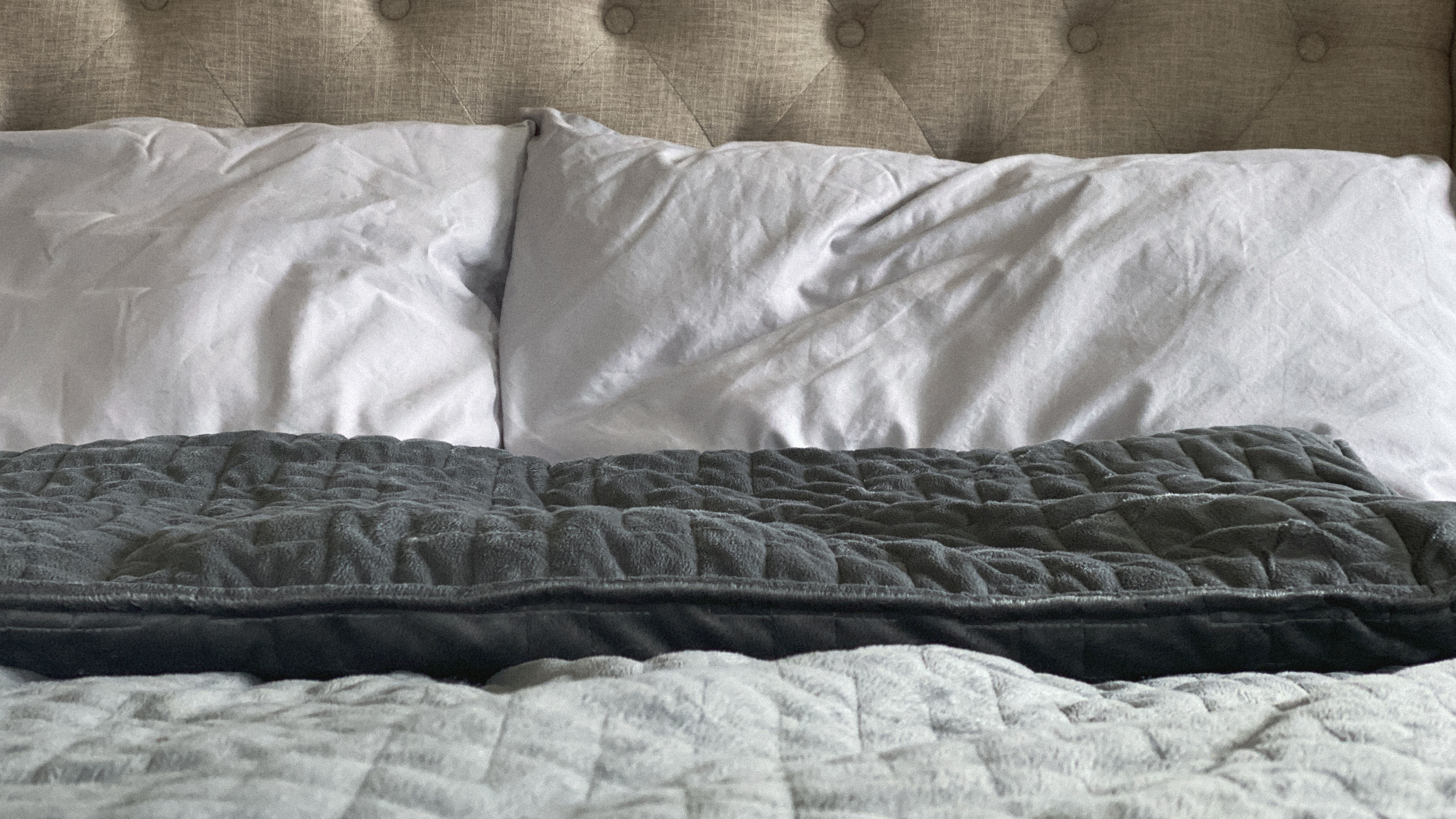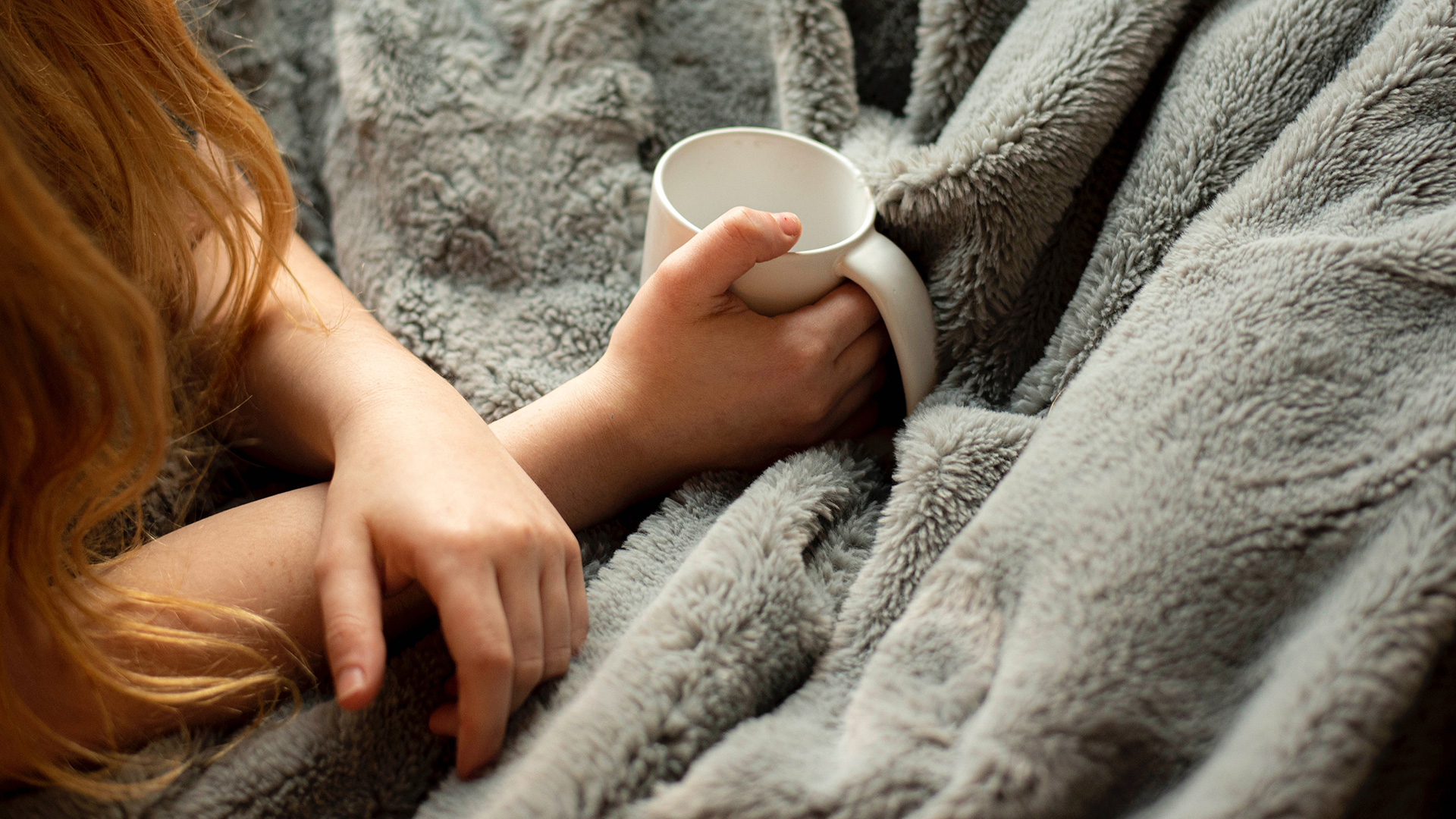How heavy should a weighted blanket be? We asked the experts
If you're wondering how heavy your weighted blanket should be, here's what you need to know

Get all the latest news, reviews, deals and buying guides on gorgeous tech, home and active products from the T3 experts
You are now subscribed
Your newsletter sign-up was successful
If you're curious about weighted blankets, you've probably wondered 'how heavy should a weighted blanket be?' These sleep aids have rocketed in popularity over the past few years, as people turn to them for help with anxiety and insomnia.
There's a range of weight options available, with lighter blankets starting at around five pounds and heavier models going all the way up to 30 pounds. As a general rule, the heavier the blanket, the greater the level of compression you'll feel when you're lying under it.
If you're buying a new blanket, we'd recommend opting for something that's equal to 10-12% of your own bodyweight, as this is the sweet spot for most people. In this article we'll delve a little deeper into what a weighted blanket is before doing our best to answer the one question everyone needs answering: how heavy should a weighted blanket be? We'll also determine whether or not a weighted blanket can be too heavy.
Before committing to buy a sleep aid of this kind, you may find it beneficial to check out our guide to some of the best weighted blankets currently available.
What is a weighted blanket?
A weighted blanket (sometimes referred to as a gravity blanket or anxiety blanket) is a regular-sized blanket that's heavier than normal, usually because it’s filled with weighted pellets. If you’re worried about a potential choking hazard from pellets in the blanket, you can also find some 100% cotton heavy knitted blankets.
Available in a range of weights from five to 30 pounds, they're able to deliver a uniform level of compression across your whole body, a satisfying sensation which feels very similar to being held.
In scientific circles this phenomenon is known as Deep Touch Pressure (DTP) or Deep Pressure Stimulation (DPS). Essentially, DPT/DPS helps make anxious people feel more calm by disengaging the internal 'fight or flight' mode within them that makes them feel persistently wound up and on edge. Thus, the feeling of being hugged or even swaddled by a weighted blanket slows down the heart rate and releases a slew of feel-good endorphins, reactions which can help ease stress and promote calm.
Get all the latest news, reviews, deals and buying guides on gorgeous tech, home and active products from the T3 experts
A modest study published in the Occupational Therapy in Mental Health journal showed that 63% of people who took part felt less anxious after using a 30-pound weighted blanket, with 78% of participants saying they preferred the blanket as a calming aid.
How heavy should a weighted blanket be?

So here it is: how heavy should a weighted blanket be? Well, the current general rule of thumb used by manufacturers and industry experts alike is that the best weight for a blanket is likely to be somewhere between 7-12% of your body weight. Leading US sleep company Nectar encourages customers to make use of this chart when making their purchasing decisions:
Adult body weight > blanket weight
- 120lb (8st 6lb) > 12lb / 5.4kg
- 130lb (9st 3lb) > 13lb / 5.9kg
- 140lb (10st) > 14lb / 6.4kg
- 150lb (10st 7lb) > 15lb / 6.8kg
- 160lb (11st 4lb) > 16lb / 7.3kg
- 170lb (12st 1lb) > 17lb / 7.7kg
- 180lb (12st 9lb) > 18lb / 8.2kg
- 190lb (13st 5lb) > 19lb / 8.6kg
- 200lb (14st 2lb) > 20lb / 9kg
A 2015 study published in the Journal of Sleep Medicine & Disorders found that participants reported improvements in sleep when using blankets that weighed 12% or more than their own body weight. But the sleep specialists at Nectar recommend starting with a 10% body weight rule when buying blankets for children, then adding an extra pound or two. Here's a helpful guide to aid parents and caregivers:
Child's weight > age > blanket weight
- 22 - 35lbs (1st 5lb - 2st 5lb) > age 3 > 5lb / 2.3kg
- 36 - 45 lbs (2st 6lb - 3st 2lb) > age 4-5 > 8lb / 3.6kg
- 46 - 70lbs (3st 3lb -5st) > age 6-10 > 12lb / 5.4kg
- 71-140lbs (5st 1lb -10st) > age 11-15 > 16lb / 7.3kg
- 141lb+ (10st+) > age 16+ > 25lb / 11.3kg
This is just a guide and should not be regarded as 'correct' for all children. Data accrued by National Autism Resources shows that a suitable amount of weight may be closer to 20% of bodyweight for some children, so you may need to experiment with different weights.
What happens if a weighted blanket is too heavy?

Trying to get to sleep under a weighted blanket that's too heavy will make you feel uncomfortable. If moving around under your blanket is a significant challenge then chances are it's too heavy. If it's way too heavy then you may start to feel trapped or panicked, or even struggle to comfortably inflate your lungs.
It's also important to note that people with certain health conditions may find that their weighted blanket puts too much pressure on their joints or other sensitive areas, even though their weighted blanket falls within the manufacturers specifications for their bodyweight.
If you're buying a weighted blanket to help your kids sleep then it's vital you make informed observations and listen to any feedback they may have. If you hear them come out with comments like “I can't roll over” or “I need to get out” then a rapid reappraisal will most likely be needed. If they quickly become agitated to the point of being flustered then treat that as a potential red flag, too.
The bottom line here is that any weighted blanket that restricts your movements and/or makes it hard to breathe is simply too heavy. It will not help you feel more calm or less stressed so you'll need to replace it with a slightly lighter blanket, one that feels heavy without feeling constricting.
Bo Heamyan is a UK-based freelance writer hailing from a Sports / Football Science background. Passionate about action, adventure and adrenaline, this former football coach and swim instructor is a zealous advocate of highlighting the many benefits a healthy lifestyle affords. When not working, Bo is happiest exploring the beautiful surrounds of rural Cambridgeshire, hiking, cycling and kayaking with his increasingly adventurous little girl.